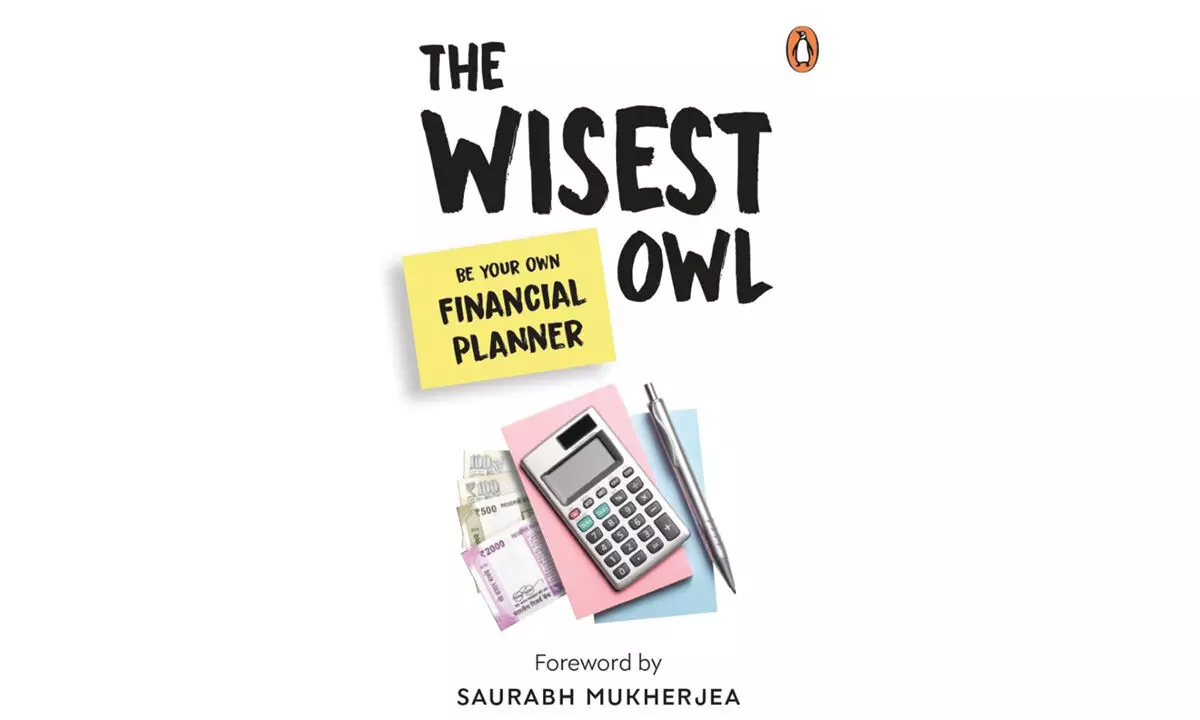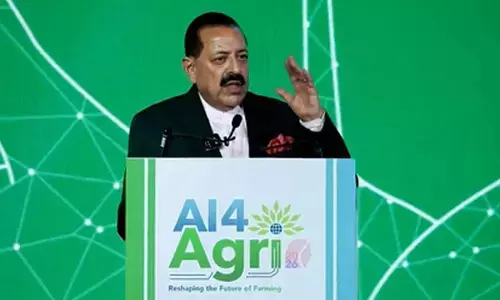A framework for future of financial planning

A framework for future of financial planning
Anupam Gupta's 'The Wisest Owl – Be Your Own Financial Planner', uses the wisdom and experience of India's top personal finance professionals like Dilshad Bilimoria, Harsh Roongta, Lovaii Navlakhi, Melvin Joseph, Suresh Sadgopan, Vishal Dhawan and Shalini Dhawan to offer a framework readers can use to create wealth in the long run
Anupam Gupta's 'The Wisest Owl – Be Your Own Financial Planner', uses the wisdom and experience of India's top personal finance professionals like Dilshad Bilimoria, Harsh Roongta, Lovaii Navlakhi, Melvin Joseph, Suresh Sadgopan, Vishal Dhawan and Shalini Dhawan to offer a framework readers can use to create wealth in the long run. The book will help general business readers including students and home makers by offering them a framework they can use to create wealth in the long run
Future of financial planning
How do you realize your financial dreams and prosper in your financial journey? The final two chapters of this book will answer these questions. This chapter points you in the right direction and the final chapter provides you with a few maps. The first step is an absolute basic one and a good place to start—how to learn about personal finance. All of us must have basic minimum knowledge about financial products and how they are useful in our lives. Over time, and once we need one, we can always consult a financial adviser. This chapter will deal with both aspects—self-learning and how financial advisers operate.
How to Begin
In the past few years, I've often heard complaints on the lines of 'I wish schools and colleges taught us more about money'. Without going into the merits of the complaint or commenting on our education system, I make one confident assertion—there is enough out there for you to start learning irrespective of your age. This book is a humble attempt. If we didn't learn about handling our finances in school, that doesn't mean we stay ignorant all our lives. The Internet opened access to tomes of literature on personal finance across visual formats like books and videos and audio formats like podcasts. You only need to ask yourself two questions: How much time in a day can you dedicate to learning, and what is your preferred way of learning, i.e., do you prefer written, video or audio content? In my experience, you will eventually adapt yourself to all three in varying amounts. There are only twenty-four hours in a day,and you have a day job. So set up a schedule that is convenient to you and begin your journey.
While there are various ways to learn, I prefer setting up a strong foundation and then updating your knowledge. Books set up this foundation and the Internet can help you update your knowledge. Often, the authors (or their firms) of the books recommended below have a significant presence on social media and following them should keep you on track. However, before you track them on social media, please track the time you spend on social media. There are hundreds, possibly thousands, of online groups and influencers across social media and getting caught up in daily content can be an enormous waste of your time. Be judicious and disciplined with your time. Your long-term goals do not depend on the daily gyrations of the stock market or the latest stock tip or idea from your WhatsApp groups. Be very careful in how you tread the murky waters of social media. Choose your content carefully and be judicious with your time.
With that important warning, here's a list of my top five authors that can help you get started. My purpose is to get you to understand basic aspects of investments (such as risk, return, liquidity, taxation, etc.), how financial products like stocks, insurance, mutual funds and credit cards work, and most importantly, make you aware of your relationship with money. These books, in my view, are the building blocks to setting up your finances for life. Four of these five authors have been on my podcast, and it was an honour to host them.
1. Saurabh Mukherjea: Obviously I'm biased since Saurabh has written the introduction to this book, and my working relationship with Saurabh goes back a few years. I had the honour of being the co-author on The Victory Project and having worked with him as a consultant from 2014 to 2018. If you can forgive the bias, then I recommend all of Saurabh's books, namely, Gurus of Chaos (Mukherjea, Gurus of Chaos: Modern India's Money Masters, 2015), The Unusual Billionaires(Mukherjea, The Unusual Billionaires, 2016), Coffee Can Investing (Mukherjea, Ranjan & Uniyal, Coffee Can Investing: The Low-Risk Road to Stupendous Wealth, 2018), The Victory Project (Mukherjea & Gupta, The Victory Project: Six Steps to Peak Potential , 2020) and Diamonds in the Dust (Mukherjea, Ranjan & Desai, Diamonds in the Dust: Consistent Compounding for Extraordinary Wealth Creation, 2021). If I had to choose just one of these, I'd go for Coffee Can Investing but I thoroughly recommend that you read the others too. You can also follow Saurabh and his team's thinking at the Marcellus newsletters which are free for subscription on their website: ww.marcellus.in.
2. Monika Halan: Disclosure yet again. Monika helped me extensively for this book. Biases apart, I think Monika is the gold standard in personal finance writing in India. She is unbiased, sharp and insightful when it comes to handling your money. In a world of influencers peddling paid content, Monika calls it straight and has often taken the industry to task for shady practices. Being a veteran adds heft and credibility. Her book, Let's Talk Money(Halan, 2018) is a must-read if you wish to learn how financial products work in India and how they are relevant to your needs. Monika is also present across social media and blogs at monikahalan.wordpress.com.
3. Deepak Shenoy: Deepak heads CapitalMind and his first book, Moneywise(Shenoy, 2021), was launched late last year. The book is easy to understand and full of anecdotes, including some from Deepak's life, that are useful for the reader to relate to in his own life. I have known Deepak since he started CapitalMind and his success speaks volumes about his abilities. Deepak is also present on social media and CapitalMind has a subscription product to which I am subscribed to.
4. Morgan Housel: Morgan Housel's The Psychology of Money (Housel, 2020) has sold millions of copies across the world. Morgan brings a refreshing change in personal finance literature because he combines learnings across multiple diverse fields from history to psychology into managing your money. Morgan is present on social media and writes regularly at the Collaborative Fund's blog: https://www.collaborativefund.com/blog/.
5. Ben Carlson: Ben Carlson's A Wealth of Common Sense (Carlson, 2015) is a great book to understand how to use two critical things—simplicity and common sense—in your financial plans. So many of us are put off by financial decisions because finance is full of jargon and complexity. In his book, Carlson explains how that's not the case and how we can keep things simple and yet achieve our financial goals. Ben is active on social media and runs a website:
6. https://www.awealthofcommonsense.com.
Why are there only five books and not ten? To keep things simple and help you start off. In these dopamine-fuelled, social media-addicted (Goldman, Scope Blog) world, reading a book is considered a major challenge. People now prefer bite-sized knowledge in the form of three-minute videos, 140-character tweets, stories on Instagram and five-line messages on WhatsApp. I think if you can finish even half of the books mentioned above, you would have started well on your journey. If you're still hungry to read more, then you will get many recommendations from the books themselves and from the updates of the authors mentioned above. Saurabh, for example, is a voracious reader and if you're subscribed to his newsletter, you'll have enough reading material to keep you busy.
As you progress in your financial journey, you might run out of time to manage your money. Many of us have day jobs, and as we grow old, our responsibilities increase and at some point, we might need a financial adviser. The next section helps you navigate the world of financial advice.
(Excerpted with permission from 'The Wisest Owl Be your own Financial Planner' By Anupam, Rs 399, published by Penguin)








